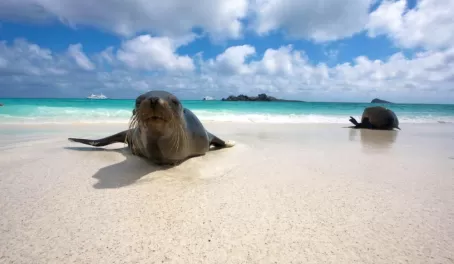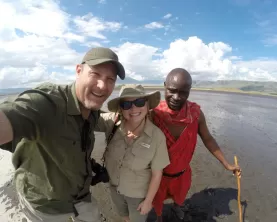Information supplied by
International Galapagos Tour Operators Association (IGTOA) The Galapagos have evolved unique species of fauna and flora found nowhere else on earth. In 1835, young Charles Darwin visited the islands, and what he learned helped inspire his theory of natural selection. In 1978, the Galapagos Islands were designated a UNESCO World Heritage, Signifying their "outstanding value to humanity." Today, they are a living laboratory of evolution and one of the world's premier ecotourism destinations. They are indeed a priceless world heritage. Like other isolated island groups, the Galapagos face serious challenges for the long-term survival of its marine and terrestrial ecosystems. The following outlines these. IGTOA members are helping to meet these challenges.
Introduced Species
From pirates and whalers to modern travelers, humans have introduced plants and animals from the outside world. Goats, for example, were introduced in the 1850's and immediately began to take food from tortoises and iguanas. On the island of Isabella, there are more than 200,000 goats, which are extremely adaptable and hard to exterminate. The Park now uses helicopters to locate them. There are many others: cats kill young iguanas and chicks of birds; dogs eat turtle eggs and hunt adult iguanas. Pigs destroy bird nests; donkeys devour vegetation; rats eat eggs of the giant tortoises. Invasive species also include insects and plants, which are equally threatening. But eliminating one species at a time is not practical. The vegetation that goats eat provides cover for feral pigs. Cats eat rats. Dogs kill cats. So there needs to be an integrated, well-designed program. Eradicating introduced species and keeping new ones from arriving is a never-ending and enormously costly struggle.
Human Impact
Humans themselves are an introduced and invasive species, and the islands have seen a dramatic growth in recent years. Settlers from mainland Ecuador have moved to the islands in search of a better life. This population pressure causes serious problems for conservation. With only three percent of the islands set aside for human settlement, there is little room for people, and little for them to do except fish. Competition between local fishermen and the National Park and conservation workers has been heated and sometimes violent. Despite restrictions on new immigration, it continues.
Threats to the Marine Reserve
The Galapagos has a rich marine ecosystem, nurtured by a confluence of ocean currents. This supports all terrestrial life on the islands. But illegal industrial fishing and over-fishing by locals threaten to undermine the marine ecosystem. Sea cucumbers and lobsters have been harvested to dangerous levels, far exceeding limits recommended by scientists. Ships from other countries routinely enter the marine reserve illegally in search of rich catches, including sharks, which are harvested solely for their fins.
Irresponsible Tourism
Ecotourism has brought great economic benefit to Ecuador, and remains the only practical way of supporting the Galapagos National Park. The model of low-impact tourism developed in the Galapagos has served the islands well. Yet there are unwanted by-products from the tourist industry - contamination from boat paint and engines, oil spills, overused sites, a drain on the fresh water supply, and introduction of plants and animals from the mainland. All of these must be addressed for tourism to work. Tourism also needs to be kept to sustainable levels. This means a limit to the number of tourists, restriction on the type of tourism development, and close monitoring of tourist impacts. As travelers, we need not feel guilt or stay away. Armed with awareness, we can shape tourism to be a positive force, find ways to give back more than we take, and make sure we are part of the solution!
Welfare of Galapagos Residents
The people of the Galapagos themselves will ultimately be the best stewards of their natural heritage. Those who live in the Galapagos Islands need to share in the benefits of tourism and require good housing, heath facilities, education, and jobs that contribute to the future of the islands.
Welfare and Education of Visitor
Those who travel to the Galapagos deserve good health and safety conditions, boats that are operated responsibly and professionally, and an enriching and educational experience. Proper training needs to be provided to captains, crews, and guides. Travelers themselves need to come prepared for their journey, with a respect for their host country, its people, and environment.
Governmental Support and Control
The Government of Ecuador has been instrumental in protecting the Galapagos Islands, and for this they should be commended. In recent years, however, there have been lapses in financial support, enforcement of laws and regulations, and proper planning. A landmark effort among organizations and governmental agencies produced the Special Law for the Galapagos. But the implementation and enforcement of this law leaves much to be desired. To understand how you can be a part of the solution,
click here.































